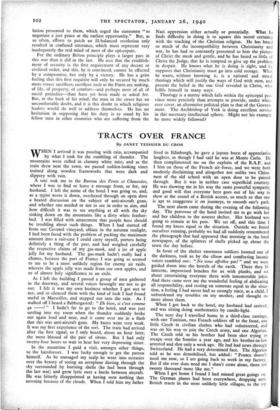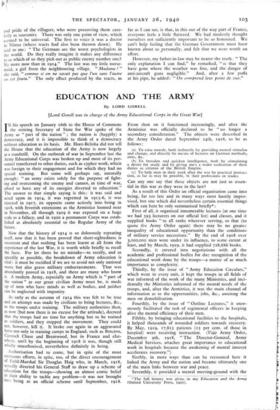TRACTS OVER FRANCE
By JANET TEISSIER DU CROS
WHEN I arrived it was pouring with rain, accompanied by what I took for the rumbling of thunder. The mountains were stifled in clammy white mist, and as the train drew near the town, we passed sodden-looking vines trained along wooden frameworks that were dark and slippery with rain.
A taxi took me to the Bureau des Ponts et Chaussees, where I was to find or leave a message from, or for, my husband. I left the name of the hotel I was going to, and, as a typist wrote it down, overheard through an open door a heated discussion on the subject of anti-aircraft guns, and whether one needed or not to see in order to aim, and bow difficult it was to see anything at all with the sky sinking down on the mountains like a dirty white feather- bed. I was filled with amazement that people here should be troubling about such things. When I had started off from our Cevenol vineyard, ablaze in the autumn sunlight, I had been faced with the problem of packing the maximum amount into a suit-case I could carry myself, porters being definitely a thing of the past, and had weighed carefully the respective claims of my gas-mask, and a jar of apple jelly for my husband. The gas-mask hadn't really had a chance, because the part of France I was going to seemed to me to be a most unlikely region for enemy air raids, whereas the apple jelly was made from our own apples, and so of almost holy significance to an exile.
As I left the building I passed a group of men gathered in the doorway, and several voices besought me not to go out. I felt it was my own business whether I got wet or not, and so silenced them with the kind of look I had found useful in Marseilles, and stepped out into the rain. As I walked off I heard a flabbergasted: "Eh bier, si c'est comme fa —I " I hadn't far to go to the hotel, and was just settling into my room when the thunder suddenly broke out again loud and near, and it came over me in a flash that this was anti-aircraft guns. My knees went very weak. It was my first experience of the sort. The train had arrived after the first signal, so I only heard, about an hour later, the more blessed of the pair of sirens. But I had only twenty-four hours to wait to hear her very depressing sister.
In the meantime I paid a visit, amongst other things, to the hairdresser. I was lucky enough to get the patron himself. As he massaged my scalp he went into ecstasies over the beauty of seeing an aeroplane darting through the sky surrounded by bursting shells (he had been through the last war) and grew lyric over a battle between aircraft. He was bitterly disappointed at having seen nothing that morning because of the clouds. When I told him my father lived in Edinburgh, he gave a joyous burst of appreciative laughter, as though I had said he was at Monte Carlo. He then complimented me on the exploits of the R.A.F. and I him on those of the French air .force, and we were both modestly disclaiming and altogether not unlike two China- men of the old school with an open door to be passed through. But it was in neither case superficial courtesy.
He was showing me in his way the same powerful sympathy and good will that everyone here goes out of his way to show at the sound of a British accent, so much so that one is apt to exaggerate it on journeys, to smooth one's path.
The next alarm came during the evening of the following day. The patronne of the hotel invited me to go with her and her children to the nearest shelter. Her husband was going to remain at his post. We set off, and this time I found my knees equal to the situation. Outside we found ourselves running, probably we had all suddenly remembered the photograph that had appeared that morning in the local newspaper, of the splinters of shells picked up about the town the day before.
In front of the shelter enormous soldiers loomed out of the darkness, took us by the elbow and comforting laconic voices rumbled out: "Ne vous affollez pas!" and we were guided down into the bowels of the earth. There they lit lanterns, improvised benches for us with planks, and set about entertaining everyone there with innumerable jokes.
And there came over me the wonderful feeling of abdicating all responsibility, and resting on someone equal to the situa- tion, a feeling I had never had so strongly since, as a child, I unburdened my troubles on my mother, and thought no more about them.
When I got back to the hotel, my husband had arrived, and was sitting doing mathematics by candle-light.
The next day I travelled home in a third-class carriage, with one Tunisian, two French soldiers off to the front, one little Czech in civilian clothes who had volunteered, and was on his way to join the Czech army, and one Algerian. The Czech told us his brother had been shot trying to escape over the frontier a year ago, and his brother-in-law arrested and shot only a week ago. He had had news through Switzerland. He had a very determined face. The Algerian told us he was demobilised, but added: "France doesn't need me now, so I am going back to work in my factory. But if she ever does need me I shan't come alone, there are twenty thousand more like me."
When I got home I found I had missed great goings on. The German planes had been everywhere, dropping anti- British tracts in the most unlikely little villages, to the joy and pride of the villagers, who were preserving them care- fully as souvenirs. There was only one point of view, which seemed to be universal. The first to voice it was a doctor in Nimes (where tracts had also been thrown down). He said to me: " The Germans are the worst psychologists in the world. Do they really imagine it makes any difference to us which of us they pick out as public enemy number one? No more now than in 1914." The last was my little nurse- maid, a girl from the neighbouring village. "Madame ! " she said, "comma si on ne savait pas que run sans l'autre on est foutu." The only effect produced by the tracts, as far as I can see, is that, in this out of the way part of France, everyone feels a little flattered. We had modestly thought ourselves not sufficiently important to be so honoured. We can't help feeling that the German Government must have known about us spersonally, and felt that we were worth an effort.
However, my father-in-law may be nearer the truth. " The only explanation I can find," he remarked, " is that they have gone where the weather was fine, and the danger of anti-aircraft guns negligible." And, after a few puffs at his pipe, he added: "On cornprend leur point de vue."







































 Previous page
Previous page